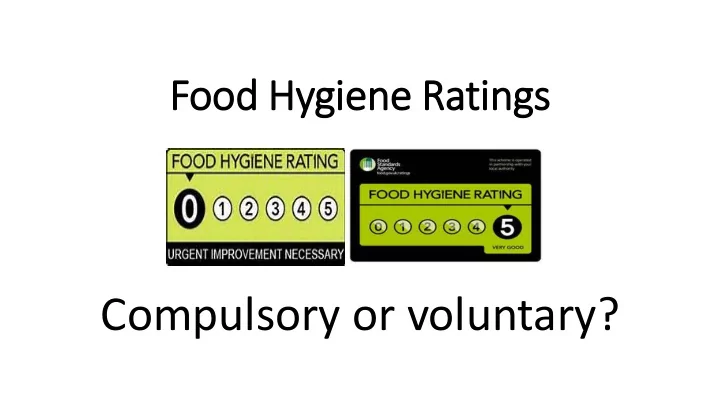

Food Hygiene Ratings Compulsory or voluntary?
FHR why bother? • helps customer choose where to eat out or shop for food by telling them how seriously the business takes their food hygiene standards. • Gives customer confidence that they are eating in a clean establishment- especially if they have children • Food scares and scandals have made people wary. • Growing number of customers now using FHR to make choices as to where to eat. • Advertising /promotion value Oh it’s definitely soup of the day, I’m just not sure which day!
How do you get your food hygiene rating? Inspection by a food safety officer from the business’s local authority. The food safety officer inspects the business and checks how well the business is meeting the law by looking at: • how hygienically the food is handled – how it is prepared, cooked, re- heated, cooled and stored • the condition of the structure of the buildings – the cleanliness, layout, lighting, ventilation and other facilities • how the business manages and records what it does to make sure food is safe At the end of the inspection, the business is given one of the six ratings from 0- 5. The top rating of ‘5’ means that the business was found to have ‘very good’ hygiene standards. Any business should be able to reach this top rating.
How can you check the FHR of a restaurant? Look for the green and black sticker in the window Check online at www.food.gov.uk/ratings
Compulsory ry FHR Wales and Northern Ir Ireland • Food Hygiene Ratings (Wales) Act 2013 – compulsory display of FHR in a prominent position by law. • 2016 Northern Ireland same requirement by law. • Forces all food establishments to display ratings in attempt to drive up quality standards and customer safety. • Scheme extended to food manufacturers, wholesalers and transporters of food. • Schools , hospitals, childrens nurseries and residential homes have also been covered. • £200 fixed penalty for failing to display food hygiene ratings. • Half of Wales food premises now have the top rating of 5.
Call for compulsory FHR in England • Local Government Association is calling for Government to apply same legislative power in England. • Force improvements and reduce cost of enforcement actions. • Councillor Simon Blackburn, Chair of the LGA’s Safer and Stronger Communities Board, said ‘ ‘Forcing all food outlets in England to display hygiene ratings would help to crack down on and expose businesses that flout the law and put people’s lives at risk by incentivising them to improve or maintain high hygiene standards and show customers how seriously they take the issue’.
Concerns fr from food industry ry • Lack of customer awareness and understanding – ‘misconceptions’ • If a premise has a low start score but makes improvements it may find it difficult to win back customers even though it has made significant improvements. • Preference for Food Standards Agency to run scheme and adopt Scottish scheme which awards a pass or fail score. • The Food Hygiene Information Scheme is designed to rate hygiene standards against legal requirements and is distinct from the Eat Safe Award scheme, which is designed to recognise businesses that have achieved standards over and above the legal requirements.
Food Standards Agency Strategy • Aims to make consumers informed and empowered • FHRS good example of allowing consumers, ‘ the right to make choices knowing the facts’. • Feedback from customers and consumers is that more businesses are using FHRS • FHRS needs regular inspections to maintain customer confidence. • Concern reductions in budgets to local authorities is meaning less inspections taking place on compliant businesses. – old FHR dates • FHRS placing strain on local authorities to maintain up to date inspections. • FSA believe FHRS is working to improve standards and benefit customers which is meeting key aims of strategy.
Need for compulsory FHR’s • Increasing awareness difficult as not compulsory to display FHR’s • Not everyone is aware of on-line facility therefore displaying FHR ‘s is key. • Inconsistencies between local authorities re. inspections (e.g. Some carrying out fewer inspections for compliant businesses) therefore no ’level -playing field’ from food premises points of view. • Older inspection dates reduces confidence of consumers, businesses and media • Tendency for high scoring premises to display FHR’s, whilst premises with lower scores do not – leads to uncertainty for customers and no incentive for poorly performing food premises to improve
Benefits of f compulsory FHRS • Useful performance management tool across multi-site businesses. • Competitive advantage both from customer choice, reduced insurance premiums and access to markets where business restricted to businesses with good FHR scores. • Reduces suspicion of consumer re, cleanliness and quality of food premise. • Informs customer choice and protects public health • Drives improvements in food standards and cleanliness within all food premises • Allows for enforcement action on those premises failing to meet standards, including failure to display FHR’s.
APSE View • Many of the concerns raised about compulsory FHRS in England have largely been addressed in Wales. • The ability to enforce displaying of FHR scores has made the scheme visible and reduced ability to operate poorly managed food premises. • FHRS plays a vital role in offering consumer choice and protecting public health • Need to undertake inspections is a challenge but will provide significant benefits both to the local authority and its residents: reduced need for enforcement actions Greater public safety and fewer public health impacts • APSE supports compulsory FHRS as a positive improvement to health and well-being of UK residents and improving the quality of UK food premises.
Recommend
More recommend